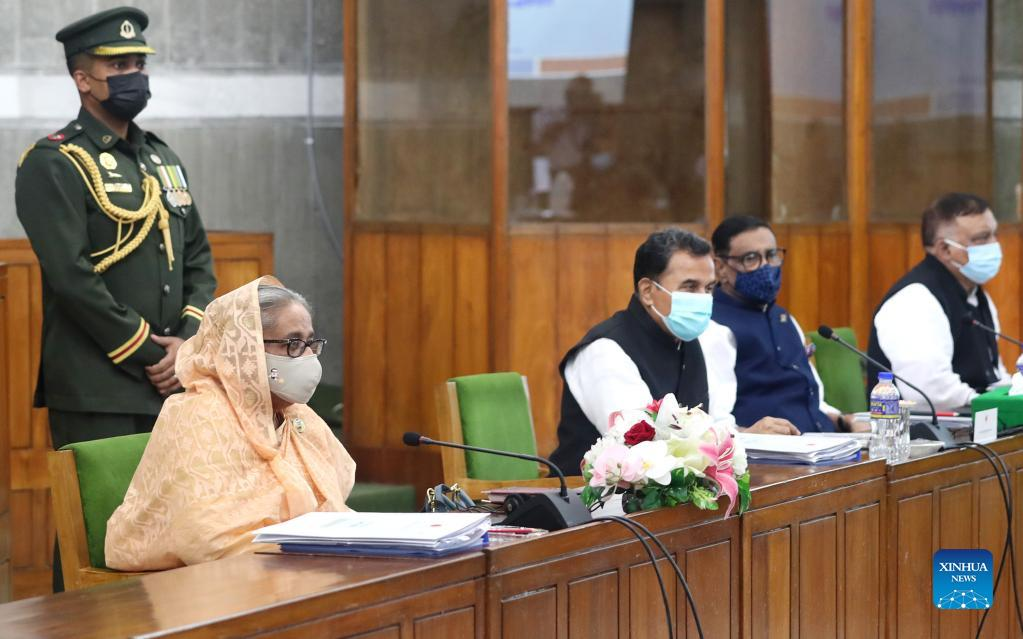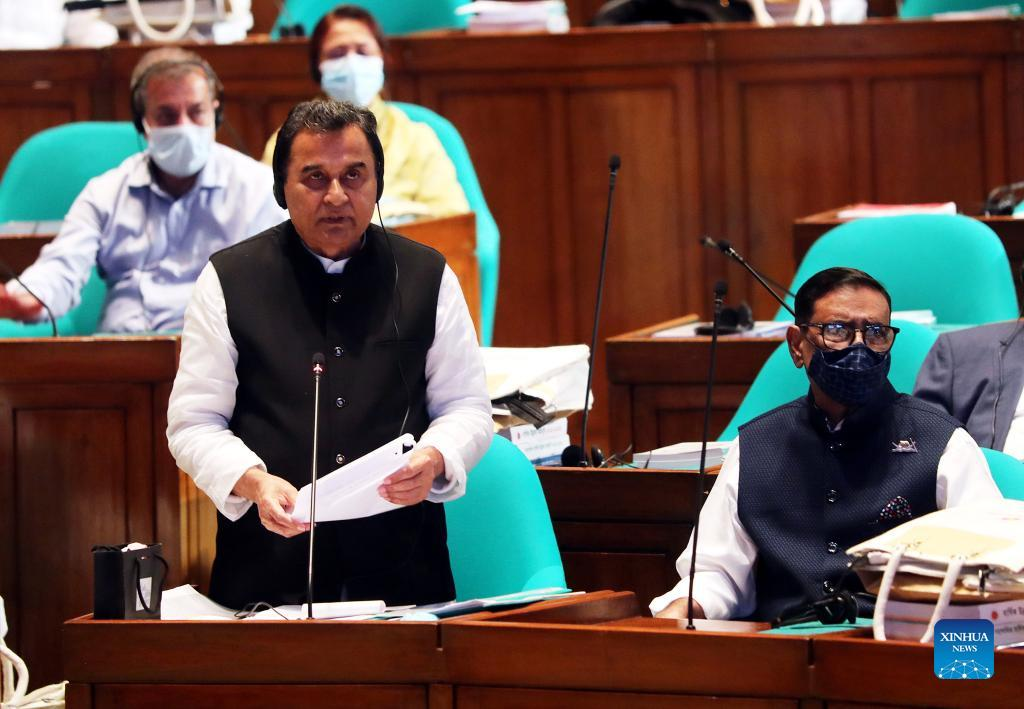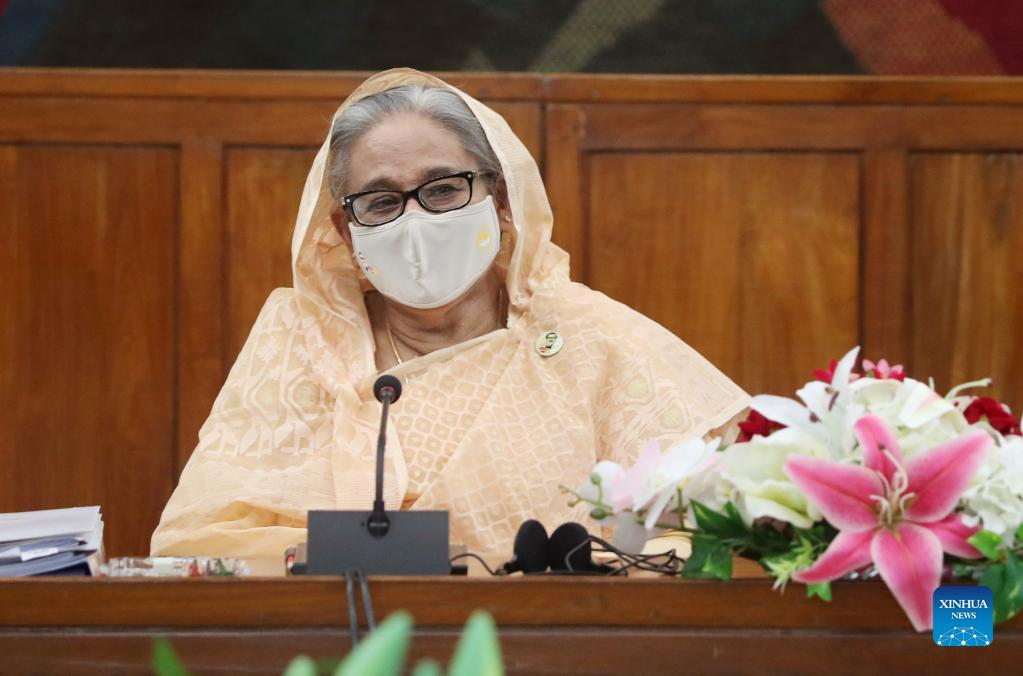
Bangladeshi Prime Minister Sheikh Hasina speaks in the parliament in Dhaka, Bangladesh on June 9, 2022. The Bangladeshi government has unveiled a record nearly 7 trillion-taka (about 76.18 billion U.S. dollars) national budget for the 2022-23 fiscal year starting in July. Finance Minister AHM Mustafa Kamal on Thursday placed before the parliament the annual budget of Prime Minister Sheikh Hasina's government. (Xinhua)
DHAKA, June 9 (Xinhua) -- The Bangladeshi government has unveiled a record nearly 7 trillion-taka (about 76.18 billion U.S. dollars) national budget for the 2022-23 fiscal year starting in July.
The government projected economic growth of 7.5 percent in the annual budget.
Finance Minister AHM Mustafa Kamal on Thursday placed before the parliament the annual budget of Prime Minister Sheikh Hasina's government.
As the total size of the expenditure budget has been estimated at 6.78 trillion taka, the outlay is 15.2 percent of the country's gross domestic product (GDP).
In his budget speech, Kamal said "Consumption and investment to increase the domestic demand and exports to increase the external demand will be one of our areas to focus on. Our goal will be to build improved communications, necessary infrastructure and ensure power and energy security through increased public, private and foreign investment."
He said the government is committed to containing the rising trend of inflation by addressing inconsistencies between supply and demand.
According to the budget proposal, Bangladesh is targeting an average inflation rate of 5.6 percent in the next fiscal year.
Kamal said there has been a recent spike in prices, mainly due to external factors.
"The causes of inflation at the global level include, among others, rising inflation in trade partners, rising oil prices, depreciation of the taka against the U.S. dollar, the disruption of the global supply chain and the Russia-Ukraine crisis, all of which are largely beyond our control," he said.
Internal factors, such as impact of the COVID-19 pandemic, also played a part, he noted.
Kamal said the total outlay of the proposed budget for the next fiscal year 2022-23 is up by 14.24 percent over that of the revised budget of the outgoing fiscal year 2021-22.
According to the proposal, the overall budget deficit will be 2.45 trillion taka, which is 5.5 percent of GDP.
Of this amount, the Bangladeshi government aims to get 1.06 trillion taka from the banking sector, 350 billion taka from selling savings certificates and rest amount as loans from other sources in the upcoming budget.
Kamal said the total estimated revenue will be 4.33 trillion taka.
On the expenditure side, he said, the size of Annual Development Program (ADP) for the next fiscal year will be 2.46 trillion taka with transport, power, infrastructure, rural development and education sectors getting the biggest chunk of money. (1 U.S. dollar equals about 90 taka) ■

Bangladeshi Finance Minister AHM Mustafa Kamal presents the annual budget in parliament in Dhaka, Bangladesh on June 9, 2022. The Bangladeshi government has unveiled a record nearly 7 trillion-taka (about 76.18 billion U.S. dollars) national budget for the 2022-23 fiscal year starting in July. Finance Minister AHM Mustafa Kamal on Thursday placed before the parliament the annual budget of Prime Minister Sheikh Hasina's government. (Xinhua)

Bangladeshi Prime Minister Sheikh Hasina speaks in the parliament in Dhaka, Bangladesh on June 9, 2022. The Bangladeshi government has unveiled a record nearly 7 trillion-taka (about 76.18 billion U.S. dollars) national budget for the 2022-23 fiscal year starting in July. Finance Minister AHM Mustafa Kamal on Thursday placed before the parliament the annual budget of Prime Minister Sheikh Hasina's government. (Xinhua)



